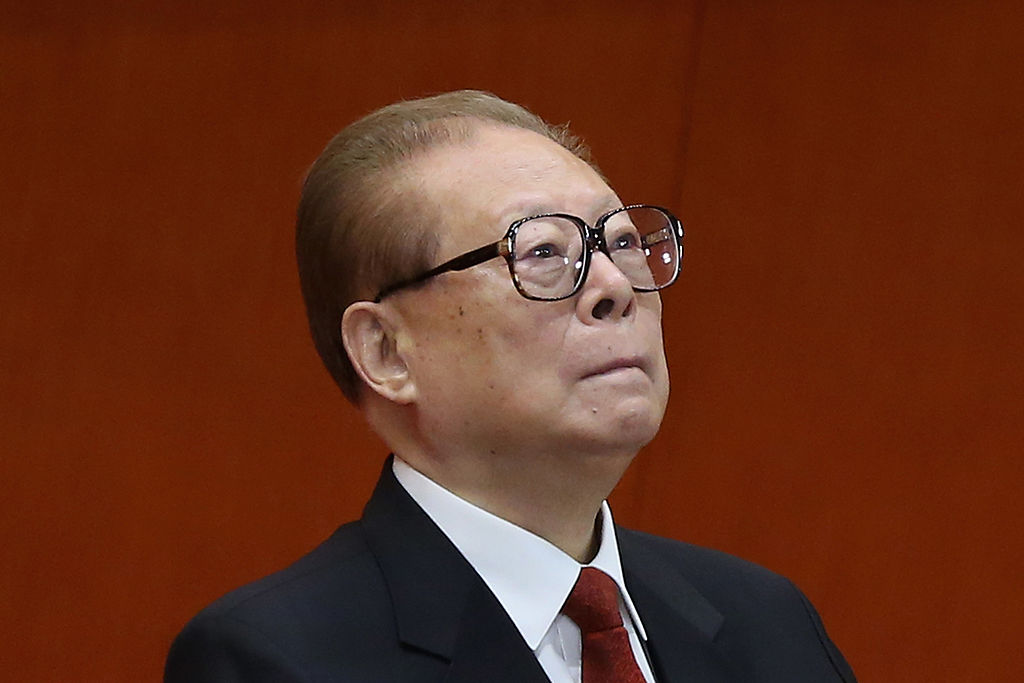It is a measure of the dark places Xi Jinping is taking China politically and economically that the rule of Jiang Zemin, who died on Wednesday aged 96, is being looked back upon with some nostalgia. During Jiang’s later years, ‘toad worship culture’ (a play on his supposed amphibious features) became popular on social media as an oblique way of criticising Xi’s rule and praising China’s relative openness under Jiang.
Stability was always Jiang’s top priority. He didn’t hesitate to crack down against any perceived threat to the CCP
Jiang was plucked from relative obscurity to head the Chinese communist party in 1989, soon after the Tiananmen Square massacre, and was president of China from 1993 to 2003. His death, from leukaemia and multiple organ failure according to the official Xinhua news agency, comes as China faces widespread protests against draconian Covid controls –arguably the biggest challenge to the party since Tiananmen.
Paramount leader Deng Xiaoping brought Jiang to Beijing from Shanghai, where he was party boss, in order to stabilise the political situation after the Tiananmen carnage, which had turned China into a virtual pariah state. He was originally seen as a transitional figure, and many described him as a ‘flower pot’, a Chinese term for a person who is showy but gets nothing done. Though, as former US ambassador to Beijing pointed out, ‘he is a good consensus builder, he’s a good manipulator’.
Others saw him as the caricature of the plodding bureaucrat, his eyes framed by huge square eyeglasses. That seemed to be supported by his CV: an electrical engineer by training, who worked in a Soviet car factory before becoming a diplomat in Romania and a minister in charge of the electronics industry. Yet he also recited poetry, played the piano and the two-stringed erhu, and once famously broke into a rendition of Elvis Presley’s ‘Love me Tender’ with Philippine president Fidel Ramos after a summit in Manila. During an appearance on American television in 2000, he recited the opening of Abraham Lincoln’s Gettysburg Address, which he had learned as a student.
After the initial repression and uncertainty of the post-Tiananmen years, Jiang is credited with re-booting economic reforms and coining the term ‘socialist market economy’ to describe the hybrid nature of a government regulated market. On his watch, private entrepreneurs were allowed to join the communist party and China joined the World Trade Organisation. He oversaw the return of Hong Kong to China in 1997, standing beside the then-Prince Charles and Tony Blair as the flag of the United Kingdom was replaced with that of China.
He was also seen as an astute opportunist. He squeezed maximum diplomatic advantage out of Nato’s accidental bombing of the Chinese embassy in Belgrade in 1999, and after the collision two years later between an American spy plane and Chinese fighter jet. But US-China relations always seemed to bounce back. Ever the pragmatist, he cooperated with Washington’s ‘war on terror’ following 11 September 2001 terror attacks. These were years of strong economic growth in China, which saw the rapid integration of the Chinese economy with that of America and the world more generally.
However, stability was always Jiang’s top priority. He didn’t hesitate to crack down against any perceived threat to the party, such as against the Falun Gong movement, a spiritualist and meditation group. It was denounced as an ‘evil cult’ in 1999 after thousands of its followers gathered near the party compound in Beijing to demand freedom from state harassment.
Even after formally relinquishing the party leadership to Hu Jintao in 2002, Jiang and fellow members of what was dubbed the ‘Shanghai clique’ retained considerable influence. In recent years, Xi has set about dismantling the power of party cliques, while centralising power around himself. Both the Jiang and Hu periods were marked by a far more collegial form of leadership, marked by term limits and the balancing of factions. Xi has swept both away, and the death of Jiang (as with the very public humiliation of a fragile-looking Hu, removed from the recent party congress apparently against his will) mark a very clear end of an era for a China once again facing serious challenges.
An official obituary published by Xinhua, the state news agency said, ‘Comrade Jiang Zemin’s passing is an insurmountable loss to our party, our military and our people.’ From Xi Jinping, who will lead a 688-member official committee in charge of his funeral arrangements, there was no mention of Jiang’s reformist credentials. Instead, China’s increasingly authoritarian leader chose to describe Jiang as a ‘great Marxist’ and a ‘socialist warrior’.







Comments